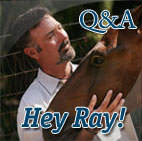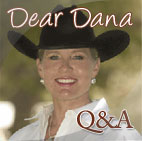Whether a hot, warm or cold blood, understand traits before you sell short!
HEY RAY!: I know you are very familiar with the Andalusian. I have an awesome Azteca gelding I am considering selling with incredible movement—great for dressage. When he moves, he has a “paddling” motion with his front feet. I believe the correct term is “Termino”. This is part of the Paso Fino movement, but is it acceptable in the Andalusian breed?
-Heidi Mahler
Is your dream horse really a nightmare to train?
Columnist Ray Ariss has tips.
HEY RAY! I’m an avid dressage rider who has owned many horses, but my Dutch Warmblood is by far the horse of my dreams. He has everything — looks, size, movement and disposition. My only wish is that he would listen to me better.He is totally dull to my aids, and it seems like the more I squeeze the less he goes. Where do I go from here?
—Debra of Arizona
Training focus helps get past those ‘crazy’ moments
HEY RAY!: I am a professional, training a 10-year-old Arabian gelding that has, with dressage training, turned into quite an impressive athlete. But, I can work him under saddle IF it is a warm day and IF there is absolutely NOTHING in or around the arena that is moving — and even then, we might be working beautifully when out of nowhere he “sees” something (a leaf moving), drops his shoulder, turns and bolts. It finally occurred to me that he’s making the choice to act this way because he “can,” and something in my training has allowed it. As his trainer, the buck has to start and stop with me – HELP!
–Gay McCall
Right approach can overcome insecurity, confusion
HEY RAY: I sent my 5 year old Thoroughbred gelding to a local trainer for 30 days to put some leg aids on him. Before he left, he didn’t know his leads but I could canter him in both directions with no problems. When I got him back I saw the trainer do leg yields and canter him on the correct leads but he seemed a little on the muscle and worried. I’ve had him at home for a month now and even though he doesn’t fight, he seems to lose his mind anytime I think of using my legs for anything. What happened? Can you help me?
Lisa Martinez, Scottsdale, Ariz.
My colt refuses to trot with me…help!
HEY RAY: I own a big 3-year-old Friesian colt that will not trot next to me when asked. He either drags behind me at the walk or when pushed will erupt into a dead-run—kicking, rearing and playing while dragging me. I’d like to show him in halter, but I’m afraid he’ll get away and hurt himself or someone.
—Jacquelyn Anderson, Fresno
This routine helps you get a leg up

HEY RAY: I have a beautiful 20-year-old Lusitano stallion that has always done everything I’ve asked of him. Lately though, when I go to pick his feet he seems to be bothered when I reach for his feet. It almost seems like he doesn’t want me to touch them, especially the back ones. Initially, I thought he was being helpful because he would pick up his feet before I asked, but when I went to hold them he would move around or snatch his foot out of my hand. Now he has gotten so bad that I am afraid I might get kicked.
–Kristin Johnson, Corona
Turn disruptive behavior into learning opportunities

HEY RAY: Whenever my horse would get heavy in my hands, what worked well was backing him up until he was “light.” This would keep him in self carriage and off my hands when moving forward again. Lately though, not only is he heavy going forward, but when I attempt to back him up, he’s remains heavy. Now I’m stuck with a horse that doesn’t mind hanging all the time. Riding him has become no fun — just a real workout. Help!
— Patricia Wiggens, Las Vegas, Nev.
Turn disruptive behavior into learning opportunities
 HEY RAY: I have a horse that is fairly responsive and soft to my hands until he gets distracted or scared, and then I have nothing but a hard-braced neck, head up, lousy brakes and poor steering. I practice suppling every time I ride but it doesn’t seem to help when he gets distracted. He also seems to look for things to spook at when we are at shows and stares at it as we go by. How can I keep him focused on our work in a snaffle when he feels like a ton of bricks in my hands?
HEY RAY: I have a horse that is fairly responsive and soft to my hands until he gets distracted or scared, and then I have nothing but a hard-braced neck, head up, lousy brakes and poor steering. I practice suppling every time I ride but it doesn’t seem to help when he gets distracted. He also seems to look for things to spook at when we are at shows and stares at it as we go by. How can I keep him focused on our work in a snaffle when he feels like a ton of bricks in my hands?
–Anonymous
What to do when your ‘perfect’ horse is beside herself
HEY RAY: I have a lesson horse that is my best money-maker at the ranch because she is easy to ride and everyone’s first pick. I can always trust she will take care of the rider and show them a good time. Here’s the problem: When another horse gets near her, she expresses all the signs of aggression. That’s why we do the lessons away from horses. I’m afraid to start something I won’t be able to handle, causing the good side of my horse to change. Should I worry?
—Christina Walker, Pine Valley
Your horse’s first show is for learning — not losing!
HEY RAY: I found out that when you train really hard at home in preparation for your first horse show, and you load up your champion hopeful, on your way to the show, something magical happens. When you arrive and you unload your trailer, the horse that comes out isn’t yours. What is that all about? Everything we worked on, everything we achieved and everything I expected went out the window. What happened?
—Ann Hutchison, Norco
HEY ANN: The phenomenon you experienced is not exclusive to you and your horse. Actually, it is the norm for most horses going to a show for the first time. It’s amazing what stress, pressure and a new environment can do to the fragile mind of an inexperienced horse. The surprises you learn at your horse’s first show usually only happen once if you pay attention. It’s not so much what you did at the show that counts, it’s more about the preparation and all that you simulate about the show at home that really makes the difference.



 Read Columns
Read Columns

